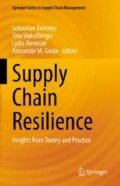Abstract
The purpose of this paper is to uncover grey areas of modern slavery and to highlight the key challenges and opportunities of modern slavery and working conditions in European road transport. Under the increasing pressure on modern slavery in supply chains, supply chain managers and researchers have mainly focused on the focal firm and/or a buying firm without considering outsourced suppliers’ activities such as transportation and logistics. To close this gap in the existing literature, the paper presents insights from the transportation and logistics field in the European Union based on an explorative online survey. The results clearly indicate the existence of modern slavery in sub-tier supplier activities in European road transportation: Short-visa holding truck drivers from non-EU Eastern Europe countries are placed in vulnerable positions where they are exploited. To manage supplier risks relating to modern slavery and working conditions, focal firms and/or buying firms need to identify and remove modern slavery risks from supply chains. Opportunities exist for supply chain risk management and investment in modern slavery reduction. More empirical evidence and theory-driven research in supply chain management are needed to facilitate the understanding and managing modern slavery risks and to contribute to supply chain resilience.
Access this chapter
Tax calculation will be finalised at checkout
Purchases are for personal use only
References
AK. (2016). Kammer für Arbeiter und Angestellte für Wien. In Vienna Chamber of Labour (Ed.), Borderless mobility - Borderless exploitation: Working conditions in Europe’s transport industry. Retrieved August 15, 2021, from https://akeuropa.eu/sites/default/files/main_report_en_411.pdf
Alsamawi, A., McBain, D., Murray, J., Lenzen, M. and Wiebe, K. (2017), “Case study – assessing social impacts in the seafood industry”, The Social Footprints of Global Trade. Environmental Footprints and Eco-Design of Products and Processes, Springer, Singapore.
Amaral, S., Scammell, H., Pons, A., Benney, R., Niu, T., Giannelos, G., Millard, K., Tweed, J., & McKinnon, A. (2021). Assessment of the impact of a provision in the context of the revision of Regulation (EC) No 1071/2009 and Regulation (EC) No 1072/2009 - Final Report. Retrieved August 14, 2021, from https://op.europa.eu/en/publication-detail/-/publication/b35587b8-72a1-11eb-9ac9-01aa75ed71a1
Chopra, S., & Sodhi, M. (2014). Reducing the Risk of Supply Chain Disruptions. MIT Sloan Management Review, 55(3), 72–80.
Christ, K., Burritt, R., & Schaltegger, S. (2020). Accounting for work conditions from modern slavery to decent work. Accounting, Auditing & Accountability Journal, 33(7), 1481–1504.
Commonwealth of Australia (2019), Commonwealth Modern Slavery Act 2018, Canberra.
Crane, A. (2013). Modern slavery as a management practice: exploring the conditions and capabilities for human exploitation. Academy of Management Review, 38(1), 49–69.
ETF. (2018). In European Transport Worker’s Federation (Ed.), Modern slavery in modern Europe. Retrieved April 11, 2021, from https://www.etf-europe.org/resource/etf-brochure-modern-slavery-in-modern-europe/
Eurostat. (2021) “Modal split of freight transport” (defined as the percentage of each inland mode in total freight transport performance measured in tonne-kilometres. Inland freight transport modes include road, rail and inland waterways). Retrieved April 10, 2021, from http://appsso.eurostat.ec.europa.eu/nui/submitViewTableAction.do
EVA. (2019). In Europäische Akademie für umweltorientierten Verkehr gGmbH (Ed.), Social conditions in logistics in Europe: Focus on road transport. Retrieved April 14, 2021, from https://psl.verdi.de/++file++5d00b20c9194fb1d8bbc127f/download/Social%20Conditions%20Logistics%20in%20Europe.pdf
European Commission. (2017). Europe on the Move: Driving change for business and people. Retrieved August 14, 2021, from https://ec.europa.eu/transport/modes/road/road-initiatives_en
European Commission. (2021). Driver attestations in road freight transport 2012–2020. Retrieved July 27, 2021, from https://ec.europa.eu/transpo/sites/default/files/driver-attestations-in-road-freight-transport.pdf (europa.eu)
Fahimnia, B., & Jabbarzade, A. (2016). Marrying supply chain sustainability and resilience: A match made in heaven. Transportation Research Part E, 91(2016), 306–324.
Gold, S., Trautrims, A., & Trodd, Z. (2015). Modern slavery challenges to supply chain management. Supply Chain Management: An International Journal, 20(5), 485–494.
Hosseini, S., Ivanov, D., & Dolgui, A. (2019). Review of quantitative methods for supply chain resilience analysis. Transportation Research Part E, 125(2019), 285–307.
Jain, V., Kumar, S., Soni, U., & Chandra, C. (2017). Supply chain resilience: model development and empirical analysis. International Journal of Production Research, 55(2), 6779–6800.
LeBaron, G. (2014). Subcontracting is not illegal, but is it unethical? Business ethics, forced labor, and economic success. The Brown Journal of World Affairs, 20(2), 237–249.
Lee, K.-H., & Vachon, S. (2016). Business Value and Sustainability: An Integrated Supply Network Perspective. Palgrave.
Manzo, K. (2005). Modern slavery, global capitalism and deproletarianisation in West Africa. Review of African Political Economy, 32(106), 521–534.
Nolan, J. (2017). Business and human rights: the challenge of putting principles into practice and regulating global supply chains. Alternative Law Journal, 42(1), 42–46.
Sreedharan, L., & Kapoor, A. (2018). Sitting on Pins and Needles. Anti-Slavery International.
Ponomarov, S. Y., & Holcomb, M. C. (2009). Understanding the concept of supply chain resilience. The International Journal of Logistics Management, 20(1), 124–143.
Stevenson, M., & Cole, R. (2018). Modern slavery in supply chains: a secondary data analysis of detection, remediation and disclosure. Supply Chain Management: An International Journal, 23(2), 81–99.
Thörnquist, A. (2019). Truck Drivers in the Grey Area between Employment and Self-employment: Swedish Experiences. Nordic Journal of Working Life Studies, 9(6), 33–52.
UK Government. (2015). Modern Slavery Act 2015. The Stationery Office, London. Retrieved March 10, 2020, from www.legislation.gov.uk/ukpga/2015/30/pdfs/ukpga_20150030_en.pdf
Author information
Authors and Affiliations
Corresponding author
Editor information
Editors and Affiliations
Rights and permissions
Copyright information
© 2022 The Author(s), under exclusive license to Springer Nature Switzerland AG
About this chapter
Cite this chapter
Lee, KH., Groschopf, W., Mossyrsch, A. (2022). Modern Slavery and Working Conditions in the European Trucking Industry: A Growing Threat to Supply Chain Resilience. In: Kummer, S., Wakolbinger, T., Novoszel, L., Geske, A.M. (eds) Supply Chain Resilience. Springer Series in Supply Chain Management, vol 17. Springer, Cham. https://doi.org/10.1007/978-3-030-95401-7_6
Download citation
DOI: https://doi.org/10.1007/978-3-030-95401-7_6
Published:
Publisher Name: Springer, Cham
Print ISBN: 978-3-030-95400-0
Online ISBN: 978-3-030-95401-7
eBook Packages: Business and ManagementBusiness and Management (R0)

